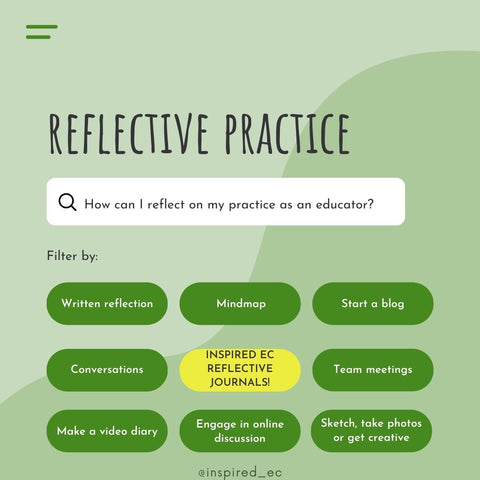Reflective Practice - Who is it for?

We know, as educators, that it is important to reflect on our practice. But do we know why? Or more to the point - who it is for?
Why should we reflect on our practice?
Let's face it - we are busy.
We are busy setting up environments.
We are busy talking to families.
We are busy cleaning up messes.
We are busy changing nappies.
We are busy putting bandaids on grazed knees.
We are busy making playdough.
And most importantly - we are busy talking, cuddling, connecting, playing and just being with children.
So, when someone talks about reflecting on your practice, it may feel like something for the "too hard" basket, something we just can't add into our day.
But, we need reflective practice.
We need it to highlight our growth and evolution as an educator.
We need it to challenge our ways of doing, being and thinking.
We need it to expose potential "blind spots" in our practice.
We need it to feel that what we do matters.
That last point might sound controversial, but hear me out. It's easy to get stuck in the mundanity of what we do in early education and care, to feel like we are just ticking tasks off a list. But it matters.
That moment of comforting a child who is upset that their parent has just left - matters.
That time spent working out what book will be embraced by a child with a curiosity for bugs - matters.
It all matters. And yet sometimes it takes us slowing down and really thinking about not just what we do - but why and how we do it, to really see that.
So, who is reflective practice for?
First and foremost - us. It is our opportunity to make sense of what we do. Chances are that you reflect each and every day... in your mind. Perhaps its thinking over your response to a challenging situation as you drive home from work, or wondering how you can support a child better as your head hits the pillow, or contemplating the layout of your block space while cooking dinner.
That's all valid. However, there are people who have a vested interest in your reflective practice:
- Director/Nominated Supervisor/Approved Provider - they may have requirements and policies in place around the completion of reflective practice, and as such may implement processes or structures for this
- Authorised Officer - seeing evidence of reflective practice is an important part of the assessment and rating process.
So, who do you write for? Write for you, but write knowing that it may be read by others who need to read it.
How do we do it?
It doesn't matter. As noted previously, your service may have a specific format or approach, but there are many ways to reflect on our practice.

Whatever approach you take (and it doesn't have to be just one) - just do it. Stop overthinking it. Stop worrying about it being perfect. Just get your thoughts out of your head and your heart, and reap the benefits as you grow as an educator.
